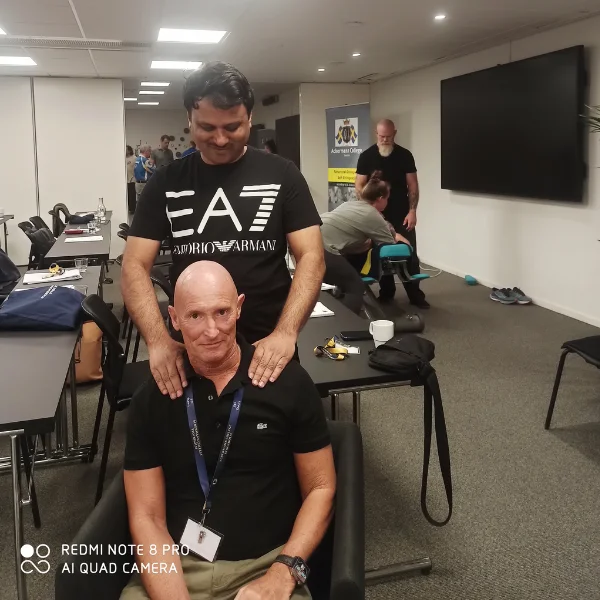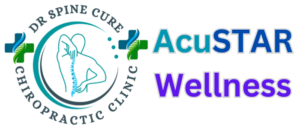7 Tips for Finding the Acupuncture Therapist Near Me (You) in Bangalore | AcuSTAR Wellness

Author
Reviewed by Dr Rudresh, MD, DM Chiro (Sweden), CDC (USA) | Europe-Certified Chiropractor
Introduction: Your Path to Natural Healing Starts Here
Are you tired of battling chronic pain, stress, or sleepless nights? Searching for a natural, drug-free solution that actually works? If you’ve been typing "acupuncture therapist near me" into Google, you’re not alone. More and more people in Bangalore—and across the world—are turning to acupuncture for relief from a wide range of conditions.
At AcuSTAR Wellness, led by the highly qualified Dr. Rudresh, we’re proud to offer expert acupuncture therapy tailored to your needs. Whether you’re in Nagarabhavi, Kengeri, or Yelahanka, our clinic is your trusted destination for holistic healing.
In this comprehensive guide, we’ll walk you through everything you need to know to find the best acupuncture therapist near you in Bangalore. From understanding what acupuncture is to discovering its proven benefits and learning how AcuSTAR Wellness stands out, you’ll have all the tools to make an informed decision. Ready to experience the healing power of acupuncture? Let’s dive in!

Understanding Acupuncture and Acupuncture Therapists
What is an Acupuncture Therapist?
An acupuncture therapist is a trained professional who uses sterile, hair-thin needles to stimulate specific points on your body—known as acupoints—to promote healing and restore balance. But here’s something crucial to understand, especially in India: not all acupuncture therapists are the same.
Some are general practitioners with basic training, while others, like Dr. Rudresh at AcuSTAR Wellness, are medically qualified acupuncturists (holding degrees like MBBS, BDS, BPT, or BAMS) with advanced acupuncture expertise. In India, only those with medical qualifications registered under the Karnataka Private Medical Establishments (KPME) Act can legally use the "Dr." title and provide advanced treatments.
Pro Tip: Always choose a licensed and experienced acupuncturist to ensure safe and effective treatment.
What is Acupuncture?
Acupuncture is a cornerstone of Traditional Chinese Medicine (TCM), rooted in the belief that your body’s energy—called Qi (pronounced "chee")—flows through pathways known as meridians. When this flow is blocked or imbalanced, illness or discomfort can follow.
By inserting ultra-fine needles into specific acupoints, acupuncture restores the flow of Qi, helping your body heal naturally. This time-tested practice, dating back over 5,000 years, is now recognized by the World Health Organization (WHO) and the FDA as a safe, effective therapy for dozens of conditions—no drugs or surgery required.

Proven Benefits of Acupuncture Therapy
Why are so many people searching for an "acupuncture therapist near me"? The answer lies in its wide-ranging benefits, backed by science and centuries of practice. Here’s what acupuncture can do for you:
- Pain Relief: From back pain and migraines to sciatica and arthritis, acupuncture reduces pain by triggering your body’s natural painkillers, like endorphins.
- Stress and Anxiety Reduction: Feeling overwhelmed? Acupuncture calms your nervous system, lowering cortisol levels and promoting relaxation.
- Better Sleep: Struggling with insomnia? It regulates sleep patterns by addressing underlying imbalances.
- Improved Digestion: Say goodbye to bloating or IBS—acupuncture harmonizes your gut.
- Enhanced Mobility: Stiff joints or limited range of motion? It boosts flexibility naturally.
At AcuSTAR Wellness, these benefits come with a personal touch. Dr. Rudresh’s medical expertise ensures treatments are tailored to your unique needs, whether you’re seeking relief from chronic pain or a holistic boost to your well-being.

AcuSTAR Wellness: Expert Acupuncture Therapy in Bangalore
Looking for the "best acupuncture therapist near me" in Bangalore? AcuSTAR Wellness is your answer. Located conveniently for residents of Nagarabhavi, Vijayanagar, Jalahalli, and beyond, our clinic blends traditional techniques with modern care.
Dr. Rudresh, a KPME-registered medical acupuncturist, brings years of experience and a passion for healing to every session. Our serene, welcoming environment is designed to make you feel at ease, while our advanced techniques—like electroacupuncture and cupping—set us apart.
What makes AcuSTAR unique?
It’s our commitment to personalized care. Whether you’re dealing with migraines or seeking weight loss support, we craft a plan just for you. Ready to feel the difference? Book your consultation with Dr. Rudresh today at acustarwellness.in!
Meet Dr. Rudresh: Your Experienced Acupuncture Therapist
Behind every great clinic is a great practitioner. Dr. Rudresh isn’t just an acupuncture therapist—he’s a medically qualified expert with credentials in allopathy, acupuncture, functional medicine, and chiropractic care.
With years of hands-on experience, he’s helped countless Bangaloreans reclaim their health naturally. His approach is simple yet powerful: listen to the patient, understand their needs, and deliver results. Whether you’re in Hebbal or Sahakar Nagar, Dr. Rudresh’s expertise is just a consultation away.
7 Essential Tips for Finding the Best Acupuncture Therapist Near You
Ready to find an "acupuncture therapist near me" in Bangalore? Follow these seven tips to ensure you choose the right one:
- Define Your Needs: What are you treating? Back pain? Anxiety? Fertility issues? Knowing your goal helps narrow your search.
- Check Credentials: Look for KPME-registered, medically qualified acupuncturists like Dr. Rudresh for advanced care.
- Read Reviews: Check AcuSTAR Wellness’s glowing Google Reviews to see what real patients say.
- Prioritize Experience: More years in practice—like Dr. Rudresh’s extensive background—mean better outcomes.
- Visit the Clinic: A clean, calm space, like AcuSTAR’s, enhances your experience.
- Ask About Techniques: Does the therapist offer cupping or scalp acupuncture? AcuSTAR provides a full range of options.
- Schedule a Consultation: Meet the therapist first. Book with AcuSTAR today to start your journey!
Your First Acupuncture Session: What to Expect
Nervous about your first visit to an "acupuncture therapist near me"? Here’s what happens at AcuSTAR Wellness:
- Initial Chat: Dr. Rudresh will review your health history and goals.
- Relaxing Setup: You’ll settle into a peaceful treatment room.
- The Process: Sterile needles are gently inserted—you might feel a tiny prick or tingle, but it’s painless. They stay in for 15-30 minutes.
- Aftercare: Expect tips on hydration or rest, plus a follow-up plan.
Most patients leave feeling lighter and more energized. Curious? Try it for yourself!
Conditions Treated with Acupuncture at AcuSTAR
Acupuncture isn’t a one-size-fits-all fix—it’s a versatile therapy. Here’s how it helps specific conditions at AcuSTAR:
- Acupuncture for Back Pain: Chronic back pain? Acupuncture targets trigger points to ease tension and improve mobility.
- Acupuncture for Anxiety: Overwhelmed by stress? It balances your nervous system for lasting calm.
- Acupuncture for Migraines: Frequent headaches? It reduces their intensity and frequency naturally.
Other conditions treated include sciatica, insomnia, digestive issues, and even smoking cessation. Visit acustar.in for more details.
Acupuncture Treatment Cost in Bangalore
Wondering about the "acupuncture treatment cost near me"? In Bangalore, sessions typically range from ₹500 to ₹1,500, depending on location and expertise. At AcuSTAR Wellness, we offer competitive pricing with the added value of Dr. Rudresh’s medical qualifications. Insurance coverage varies, so check with your provider. Want a precise quote? Contact us today!
Is Acupuncture Safe? Understanding Potential Side Effects
Yes, acupuncture is incredibly safe when performed by a licensed expert like Dr. Rudresh. We use sterile, single-use needles to eliminate infection risks. Minor side effects—like slight bruising or soreness—are rare and fade quickly. Pregnant? Have a pacemaker? Let us know—we’ll adjust accordingly.
AcuSTAR Success Stories: Real Patients, Real Results
Here’s how acupuncture has transformed lives at AcuSTAR:
- Anita, 35, Nagarabhavi: After six sessions, her migraines dropped by 50%.
- Raj, 40, Vijayanagar: Chronic back pain faded after 20 treatments—now he’s jogging again.
- Priya, 30, Jalahalli: Conceived naturally after 12 sessions for PCOS.
These Bangalore locals found relief—could you be next?
The History and Science of Acupuncture
Acupuncture’s roots stretch back 5,000 years to ancient China, where it was developed to balance Qi. Today, science backs it up: studies (like those on PubMed) show it reduces pain and boosts mood by stimulating nerve pathways. It’s ancient wisdom meets modern proof.
Did You Know? Fun Facts About Acupuncture
- It’s been used to treat over 30 conditions, per the NIH.
- The needles are thinner than a human hair—ouch-free!
- Even astronauts have tried it for stress relief.
FAQs: Acupuncture Therapy Near Me
Yes, acupuncture can support weight loss by regulating metabolism and reducing stress-related eating.
Acupuncture is generally safe for all ages, but it's best to consult with a practitioner for children or elderly patients.
The effects can vary, but many patients report lasting benefits with regular sessions.
Yes, acupuncture can improve fertility by balancing hormones and reducing stress.
Yes, mild soreness is common and usually fades quickly.
Yes, acupuncture can complement other treatments, but always consult your healthcare provider.
Acupuncture is generally safe during pregnancy, but inform your practitioner.
No specific dietary restrictions, but staying hydrated and avoiding heavy meals before sessions is recommended.
Yes, acupuncture can alleviate allergy and sinus symptoms.
Yes, numerous studies support the effectiveness of acupuncture for various conditions.
No special preparation is needed, but wear comfortable clothing.
Look for a licensed practitioner with medical qualifications and advanced acupuncture training.
Yes, acupuncture can alleviate symptoms like nausea and fatigue.
Acupuncture can aid in recovery and performance, but inform your practitioner about your training schedule.
Yes, acupuncture can help balance hormones and improve overall well-being.
Yes, acupuncture can be safe for children, but consult with a practitioner experienced in pediatric care.
Acupuncture offers a natural, drug-free alternative to other pain therapies.
Yes, acupuncture can support smoking cessation by reducing cravings and stress.
Generally, no limits, but listen to your body and avoid strenuous activity immediately after a session.
Acupuncture can provide both temporary relief and long-term benefits with regular sessions.
Top 10 Key Differences Between Acupuncture Therapist vs. Acupressure Therapist
| Aspect | Acupuncture Therapist | Acupressure Therapist |
|---|---|---|
| Method | Uses sterile needles to stimulate acupoints | Applies finger or tool pressure to acupoints |
| Tools | Hair-thin needles | Hands, elbows, or blunt tools |
| Training | Requires medical qualifications (e.g., MBBS) + acupuncture | Often shorter courses, no medical degree needed |
| Depth of Treatment | Penetrates skin for deeper energy flow | Surface-level pressure, less invasive |
| Conditions Treated | Complex issues like neuropathy, cancer pain | Stress, mild pain, relaxation |
| Speed of Results | Often faster due to direct stimulation | Slower, gentler approach |
| Safety | Sterile needles; minimal risk with pros like Dr. Rudresh | No needles, very low risk |
| Regulation in India | KPME registration for advanced care | Less regulated, varies by practitioner |
| Cost in Bangalore | ₹500-₹1,500 per session | ₹300-₹1,000, typically cheaper |
| Best For | Chronic conditions, precise healing | Beginners or needle-phobic patients |
Latest News Articles About Acupuncture Therapy (March 2025)
- "Acupuncture Gains Traction in Bangalore for Stress Relief" - Local clinics like AcuSTAR report a 30% rise in stress-related bookings this year.
- "WHO Expands Acupuncture Recommendations" - New 2025 guidelines add fertility and allergies to its approved list.
- "Study: Acupuncture Outperforms Meds for Migraines" - A PubMed trial shows 60% better outcomes with needles.
- "Indian Medical Council Tightens Acupuncture Rules" - Only KPME-registered therapists can treat advanced cases now.
- "Tech Meets Tradition: Electroacupuncture Booms" - Clinics near me, including AcuSTAR, see demand spike for this hybrid technique.
- "Athletes Turn to Acupuncture for Recovery" - Bangalore marathon runners credit it for faster healing.
- "Affordable Acupuncture Clinics Pop Up Across India" - Prices drop as more therapists train, says a recent survey.
- "Acupuncture Linked to Better IVF Success" - A 2025 study boosts hope for couples near me seeking fertility help.
- "Cupping Therapy Surges Alongside Acupuncture" - Patients at AcuSTAR pair it for detox and pain relief.
- "Pediatric Acupuncture Gains Ground" - Parents report fewer asthma attacks in kids after sessions.
Stay tuned—acupuncture’s making waves, and AcuSTAR’s at the forefront!
Top 7 Key Takeaways
- Acupuncture is a safe, natural therapy for pain, stress, and more.
- Dr. Rudresh at AcuSTAR Wellness offers medically qualified care.
- Look for credentials and experience when choosing a therapist.
- Sessions cost ₹500-₹1,500 in Bangalore.
- It treats conditions from migraines to infertility.
- AcuSTAR serves all of Bangalore, from Kengeri to Hebbal.
- Book today for personalized healing!
Conclusion: Your Healing Journey Awaits
Searching for an "acupuncture therapist near me" in Bangalore? AcuSTAR Wellness is here to help. With Dr. Rudresh’s expertise, cutting-edge techniques, and a passion for your well-being, we’re ready to guide you to better health. Don’t let pain or stress hold you back—contact AcuSTAR Wellness today at acustar.in to schedule your consultation. Your path to natural healing starts now!
-
Natural Pain Relief Experts04 Mar 2025 treatment
-
7 Ways How Acupuncture In Bangalore Can Change Your Life - Ultimate Guide04 Mar 2025 treatment
-
Coccydynia (Tailbone Pain) Explained: Understanding Tailbone Pain Causes, Symptoms & Relief19 Mar 2025 treatment
-
Acupuncture Therapy Near Me (You) in Bangalore: AcuSTAR Wellness05 Mar 2025 treatment
-
7 Quick Ways to Relieve Back Pain in Bangalore Now [100% Natural and Really Works}20 Apr 2025 treatment
Other Services
- Neck Pain Treatment
- Sciatica Pain Treatment
- Spondylosis Treatment
- Disc Bulge/Herniated Disc Tx
- Spinal Pain & Nerve Pains
- Scoliosis Correction Treatments
- Kyphosis Correction Therapy
- Posture Correction Treatments
- Arthritis and Joint Pains
- Headaches and Migraines
- Cervical Spondylitis Treatments
- Myofascial Release Therapy
About Us
AcuSTAR Wellness (Dr. Spine Cure) Chiropractic is a premier, KPME-Rgd Spine, Disc & Joint Pain clinic in Bangalore. It offers natural pain relief treatments for back pain, neck pain, sciatica, body pain, spondylitis, knee pain, arthritis, posture correction using chiropractic treatments without surgery. Initiative of Dr. Rudresh, Europe-certified & licenced; HN-Scientific award-winning allopathy doctor cum licensed chiropractor in Bangalore for safe & effective chiropractic adjustments
Opening Hours
- Monday ..... 08:00 - 22:00
- Tuesday ......08:00 - 22:00
- Wednesday..08:00 - 22:00
- Thursday ....08:00 - 22:00
- Friday .........08:00 - 22:00
- Saturday .....09:00 - 22:00
- Sunday: Based on appointment
________________________________
Chiropractic Treatments are based on Appointment Only
Quick Contact
- +91-7676760107
-
#1: Jakkuru Clinic, 425, 12th Cross, Jakkuru main road, Bangalore 560064
#2: Nagarabhavi Clinic, 478, 11th Cr, AP nagar, Nagarabhavi II Stage, Blore 560091 - acustarwellness@mail.com
